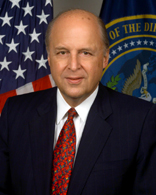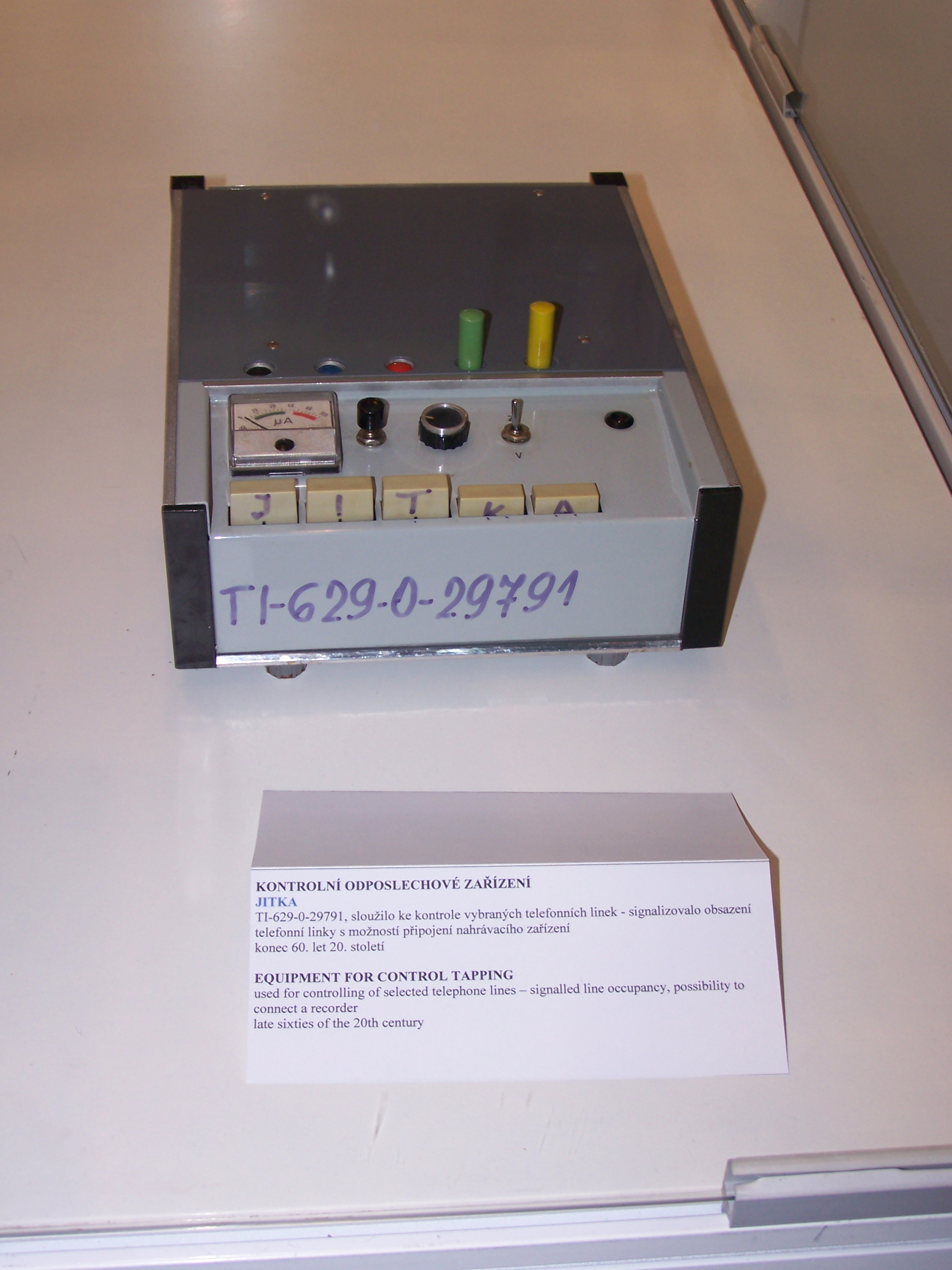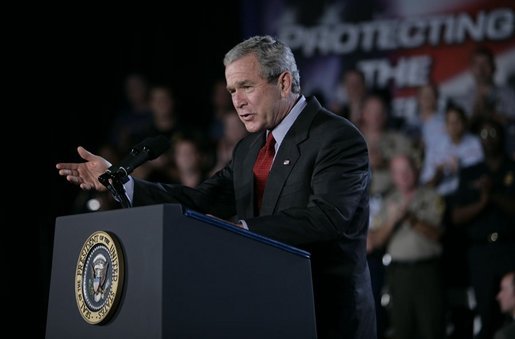|
Protect America Act
The Protect America Act of 2007 (PAA), (, enacted by ), is a controversial amendment to the Foreign Intelligence Surveillance Act (FISA) that was signed into law by U.S. President George W. Bush on August 5, 2007. It removed the warrant requirement for government surveillance of foreign intelligence targets "reasonably believed" to be outside the United States.Statement for the Record to the House Judiciary Committee by Director John Michael McConnell September 18, 2007 The FISA Amendments Act of 2008 reauthorized many provisions of the Protect America Act in |
Foreign Intelligence Surveillance Act
The Foreign Intelligence Surveillance Act of 1978 ("FISA" , ) is a United States federal law that establishes procedures for the physical and electronic surveillance and the collection of "foreign intelligence information" between "foreign powers" and "agents of foreign powers" suspected of espionage or terrorism.50 USC §1801(b) "'Agent of a foreign power' means— (1) any person other than a United States person, who— (A) acts in the United States as an officer or employee of a foreign power, or as a member of a foreign power as defined in subsection (a)(4), irrespective of whether the person is inside the United States; (B) acts for or on behalf of a foreign power which engages in clandestine intelligence activities in the United States contrary to the interests of the United States, when the circumstances indicate that such person may engage in such activities, or when such person knowingly aids or abets any person in the conduct of such activities or knowingly conspires ... [...More Info...] [...Related Items...] OR: [Wikipedia] [Google] [Baidu] |
Authorization For Use Of Military Force Against Terrorists
The Authorization for Use of Military Force (AUMF) (, ) is a joint resolution of the United States Congress which became law on September 18, 2001, authorizing the use of the United States Armed Forces against those responsible for the September 11 attacks. The authorization granted the President the authority to use all "necessary and appropriate force" against those whom he determined "planned, authorized, committed or aided" the September 11 attacks, or who harbored said persons or groups. The AUMF was passed by the 107th Congress on September 18, 2001, and signed into law by President George W. Bush on September 18, 2001. Since 2001, U.S. Presidents have interpreted their authority under the AUMF to extend beyond al Qaeda and the Taliban in Afghanistan to apply to numerous other groups as well as other geographic locales. In December 2016, the Office of the President published a brief interpreting the AUMF as providing Congressional authorization for the use of force against ... [...More Info...] [...Related Items...] OR: [Wikipedia] [Google] [Baidu] |
United States Foreign Intelligence Surveillance Court Of Review
The United States Foreign Intelligence Surveillance Court of Review (FISCR) is a U.S. federal court whose sole purpose is to review denials of applications for electronic surveillance warrants (called FISA warrants) by the United States Foreign Intelligence Surveillance Court (or FISC). The FISCR was established by the Foreign Intelligence Surveillance Act of 1978 (known as FISA for short) and consists of a panel of three judges. Like the FISC, the FISCR is not an adversarial court; rather, the only party to the court is the federal government, although other parties may submit briefs as ''amici curiae'' if they are made aware of the proceedings. Papers are filed and proceedings are held in secret. Records of the proceedings are kept classified, though copies of the proceedings with sensitive information redacted are very occasionally made public. The government may appeal decisions of the FISCR to the Supreme Court of the United States, which hears appeals on a discretionary ba ... [...More Info...] [...Related Items...] OR: [Wikipedia] [Google] [Baidu] |
110th United States Congress
The 110th United States Congress was a meeting of the legislative branch of the United States federal government, between January 3, 2007, and January 3, 2009, during the last two years of the Presidency of George W. Bush. It was composed of the Senate and the House of Representatives. The apportionment of seats in the House was based on the 2000 U.S. Census. The Democratic Party won a majority in both chambers, giving them full control of Congress for the first time since the 103rd Congress in 1993, which was also the previous time they controlled the House. Officially in the Senate, there were 49 Democrats, 49 Republicans, and two independents, but because both of the independents caucused with the Democrats, this gave the Democrats an operational majority. No Democratic-held seats had fallen to the Republican Party in the 2006 elections. This is the most recent Congress to feature a Republican Senators from Minnesota (Norm Coleman), New Mexico ( Pete Domenici) and ... [...More Info...] [...Related Items...] OR: [Wikipedia] [Google] [Baidu] |
Director Of National Intelligence
The director of national intelligence (DNI) is a senior, cabinet-level United States government official, required by the Intelligence Reform and Terrorism Prevention Act of 2004 to serve as executive head of the United States Intelligence Community (IC) and to direct and oversee the National Intelligence Program (NIP). All IC agencies report directly to the DNI. The DNI also serves, upon invitation, as an advisor to the president of the United States, the National Security Council and the Homeland Security Council on all intelligence matters. The DNI, supported by the Office of the Director of National Intelligence (ODNI), produces the President's Daily Brief (PDB), a top-secret document including intelligence from all IC agencies, handed each morning to the president of the United States. President George W. Bush strengthened the role of the DNI on July 30, 2008, with Executive Order 13470, which, among other things, solidified the DNI's authority to set goals for intelligenc ... [...More Info...] [...Related Items...] OR: [Wikipedia] [Google] [Baidu] |
United States Attorney General
The United States attorney general (AG) is the head of the United States Department of Justice, and is the chief law enforcement officer of the federal government of the United States. The attorney general serves as the principal advisor to the president of the United States on all legal matters. The attorney general is a statutory member of the Cabinet of the United States. Under the Appointments Clause of the United States Constitution, the officeholder is nominated by the president of the United States, then appointed with the advice and consent of the United States Senate. The attorney general is supported by the Office of the Attorney General, which includes executive staff and several deputies. Merrick Garland has been the United States attorney general since March 11, 2021. History Congress passed the Judiciary Act of 1789 which, among other things, established the Office of the Attorney General. The original duties of this officer were "to prosecute and conduct all sui ... [...More Info...] [...Related Items...] OR: [Wikipedia] [Google] [Baidu] |
Foreign Agent
A foreign agent is any person or entity actively carrying out the interests of a foreign country while located in another host country, generally outside the protections offered to those working in their official capacity for a diplomatic mission. Foreign agents may be citizens of the host country. In contemporary English, the term has a generally pejorative connotation. A covert foreign agent, also known as a ''secret agent'' of a foreign government, may in some countries be presumed to be engaging in espionage. Legality Some countries have formal procedures to legalize the activities of foreign agents acting overtly. Laws covering foreign agents vary widely from country to country, and selective enforcement may prevail within countries, based on perceived national interest. United States In the United States, the Foreign Agents Registration Act (FARA) created a wide-ranging and detailed definition of "foreign agent." The FARA is sometimes claimed to be used to target c ... [...More Info...] [...Related Items...] OR: [Wikipedia] [Google] [Baidu] |
United States Foreign Intelligence Surveillance Court
The United States Foreign Intelligence Surveillance Court (FISC), also called the FISA Court, is a U.S. federal court established under the Foreign Intelligence Surveillance Act of 1978 (FISA) to oversee requests for surveillance warrants against foreign spies inside the United States by federal law enforcement and intelligence agencies. FISA was created by the U.S. Congress based on the recommendations of the Senate's Church Committee, which was convened in 1975 to investigate illicit activities and civil rights abuses by the federal intelligence community. Pursuant to the law, the FISC reviews requests to conduct physical and electronic surveillance within the U.S. concerning "foreign intelligence information" between "foreign powers" and "agents of foreign powers" suspected of espionage or terrorism; such requests are made most often by the National Security Agency (NSA) and the Federal Bureau of Investigation (FBI). From its opening in 1978 until 2009, the court was h ... [...More Info...] [...Related Items...] OR: [Wikipedia] [Google] [Baidu] |
ACLU
The American Civil Liberties Union (ACLU) is a nonprofit organization founded in 1920 "to defend and preserve the individual rights and liberties guaranteed to every person in this country by the Constitution and laws of the United States". The ACLU works through litigation and lobbying, and has over 1,800,000 members as of July 2018, with an annual budget of over $300 million. Affiliates of the ACLU are active in all 50 states, the District of Columbia, and Puerto Rico. The ACLU provides legal assistance in cases where it considers civil liberties to be at risk. Legal support from the ACLU can take the form of direct legal representation or preparation of ''amicus curiae'' briefs expressing legal arguments when another law firm is already providing representation. In addition to representing persons and organizations in lawsuits, the ACLU lobbies for policy positions that have been established by its board of directors. Current positions of the ACLU include opposing the death ... [...More Info...] [...Related Items...] OR: [Wikipedia] [Google] [Baidu] |
Telephone Tapping
Telephone tapping (also wire tapping or wiretapping in American English) is the monitoring of telephone and Internet-based conversations by a third party, often by covert means. The wire tap received its name because, historically, the monitoring connection was an actual electrical tap on the telephone line. Legal wiretapping by a government agency is also called lawful interception. Passive wiretapping monitors or records the traffic, while active wiretapping alters or otherwise affects it. Legal status Lawful interception is officially strictly controlled in many countries to safeguard privacy; this is the case in all liberal democracies. In theory, telephone tapping often needs to be authorized by a court, and is again in theory, normally only approved when evidence shows it is not possible to detect criminal or subversive activity in less intrusive ways. Oftentimes, the law and regulations require that the crime investigated must be at least of a certain severity. Illegal ... [...More Info...] [...Related Items...] OR: [Wikipedia] [Google] [Baidu] |
Section Summary Of The USA PATRIOT Act, Title II
The following is a section summary of the USA PATRIOT Act, Title II. The USA PATRIOT Act was passed by the United States Congress in 2001 as a response to the September 11, 2001 attacks. Title II: Enhanced Surveillance Procedures gave increased powers of surveillance to various government agencies and bodies. This title has 25 sections, with one of the sections (section 224) containing a sunset clause which sets an expiration date, 31 December 2005, for most of the title's provisions. On 22 December 2005, the sunset clause expiration date was extended to 3 February 2006. Title II contains many of the most contentious provisions of the act. Supporters of the Patriot Act claim that these provisions are necessary in fighting the War on Terrorism, while its detractors argue that many of the sections of Title II infringe upon individual and civil rights. The sections of Title II amend the Foreign Intelligence Surveillance Act of 1978 and its provisions in 18 U.S.C., dealing with "Cr ... [...More Info...] [...Related Items...] OR: [Wikipedia] [Google] [Baidu] |
Glenn Greenwald
Glenn Edward Greenwald (born March 6, 1967) is an American journalist, author and lawyer. In 2014, he cofounded ''The Intercept'', of which he was an editor until he resigned in October 2020. Greenwald subsequently started publishing on Substack. In 1996, Greenwald founded a law firm concentrating on First Amendment litigation. He began blogging on national security issues in October 2005, while he was becoming increasingly concerned with what he viewed to be attacks on civil liberties by the George W. Bush Administration in the aftermath of the September 11 attacks. He became a vocal critic of the Iraq War and has maintained a critical position of American foreign policy. Greenwald started contributing to '' Salon'' in 2007, and to ''The Guardian'' in 2012. In June 2013, while at ''The Guardian'', he began publishing a series of reports detailing previously unknown information about American and British global surveillance programs based on classified documents provided by Ed ... [...More Info...] [...Related Items...] OR: [Wikipedia] [Google] [Baidu] |






.jpg)